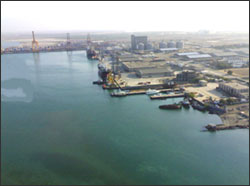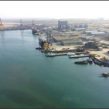
BRIEFS
Publication: Terrorism Monitor Volume: 12 Issue: 20
By:

HOUTHI REBELS SEIZE YEMENI PORT
Kathryn Basinsky
On October 14, Houthi rebels captured the Yemeni city of Hodeidah on the Red Sea coast. Hodeidah is the second largest port in Yemen as well as the country’s fourth largest city. According to one account, the rebels “took control of the checkpoints without fighting any soldiers,” and control the airport as well, although it continues to operate (Yemen Times, October 15). The group had previously captured the national capital of Sana’a in September and many members still control a number of government buildings. [1]
The Houthis are a political-religious movement made up of Zaydi Shi’ites based in the northern highlands of Yemen who have fought against the central Yemeni government for many years. Among other complaints, Houthis disagree with the current structure of the Yemeni government, desiring that that the north of the country be one region instead of the current three (al-Jazeera, October 16). While the Houthis controlled Sana’a, Yemeni President Abd Rabbu Mansour Hadi appointed Khaled Bahah as prime minister as part of the Houthis’ demands. Rebels also signed the Peace and National Partnership Agreement, a guideline for a federal state. As a part of this agreement, the Houthis agreed to leave Sana’a, but this has yet to happen (al-Ahram Weekly, October 16).
In addition to their fight against the Yemeni state, the Houthis are also enemies of al-Qaeda in the Arabian Peninsula (AQAP) because the Salafist AQAP views the Shi’a Houthis as heretics. According to one account, the Houthis seized an arsenal in Hodeidah that belonged to Ali Mohsen, a fugitive general who the rebels accuse of funding and supplying al-Qaeda (al-Ahram Weekly, October 16). Shortly after Houthis seized Hodeidah, other Houthi fighters clashed with militants from Ansar al-Shari’a, a close affiliate of AQAP, and ultimately seized control of Ibb, a city 150 kilometers south of Sana’a and close to an AQAP stronghold (al-Jazeera, October 16). Skirmishes have continued between the two groups since Ibb fell.
Hodeidah is Yemen’s primary oil export hub. Control of the port gives the Houthi rebels further leverage over Sana’a as the rebel group has asked all foreign oil companies to stop exports immediately (Daily Sabah [Istanbul], October 16). Port access also provides an easier means of obtaining weapons for the interior Houthi strongholds, potentially from Iran, which already provides financial support as well as small arms and ammunition for the rebel group (Al-Monitor, October 19). In early 2013, an Iranian ship was intercepted by Yemeni authorities carrying explosives and surface-to-air missiles (Reuters, February 2, 2013). This support goes all the way to the top of Iran’s leadership; a high-level advisor to Grand Ayatollah Ali Khamenei said that “Iran supports the rightful struggle of [the Houthis] in Yemen” (Arab News, October 22). Iran supports the movement as a way of disrupting Saudi Arabia’s involvement in Yemen and because of the shared Shi’a denomination. The additional funding of the Houthis through port activities and access will be enough to provide for the materials needed to continue their assault on both the government and al-Qaeda. With the capital and a significant port under the control of Houthi rebels and al-Qaeda strongholds in other parts of the country, the Yemeni government is clearly too weak to intervene between the two groups, promising more violence and destabilization in the country.
Kathryn Basinsky is a program associate for The Jamestown Foundation in the Global Terrorism Analysis program. You can follow her on Twitter @kbasinsky.
Note
1. For more on the Houthi expansion, please see Terrorism Monitor, May 2, 2014, https://www.jamestown.org/regions/middleeast/single/article_id=42302&tx_ttnews%5BbackPid%5D=677&cHash=fe7c90cfc01735fb85cfb70485b1eb22#.VEfeN_nF_To.
DESPERATE FOR RECRUITS, TEHRIK-E-TALIBAN PAKISTAN DECLARES THEN RETRACTS SUPPORT FOR ISLAMIC STATE
Abubakar Siddique
The Islamic State organization is proving to be a magnet for desperate Pakistani Taliban figures and factions after their umbrella organization, the Tehrik-e-Taliban Pakistan (TTP), has been rapidly fragmented by rivalries, assassinations and doctrinal divisions. The once powerful organization that controlled large swathes of territory in northwestern Pakistan is rapidly losing leaders and fighters.
In the latest sign of its rapid disintegration, the TTP condemned its former spokesman Shahidullah Shahid, whose real name, it claimed, is Shaykh Maqbool (RFE/RL Gandhara, October 21). A TTP statement on October 20 said that the sacked spokesman used the position “for personal gains.” The statement reiterated that the current TTP leader Mullah Fazlullah has pledged an oath of allegiance to the Afghan Taliban leader Mullah Muhammad Omar, which apparently repudiated the Islamic State organization’s claim over the Islamic caliphate (The News [Islamabad], October 21).
The statement followed an October 14 announcement in which by Shahid announced his allegiance to the Islamic State. He also claimed that five little-known TTP commanders from the northwestern tribal areas and Khyber Pakhtunkhwa province have also joined the extreme jihadist faction now controlling large parts of Iraq and Syria. “From today, I accept Abu Bakr al-Baghdadi as my caliph and I will accept every directive of his and will fight for him whatsoever the situation,” Shahid said in a video statement (The News [Islamabad], October 21).
The most important TTP defection to the Islamic State happened in September when a powerful faction led by Omar Khalid Khorasani declared its support for the Islamic State organization. The faction renamed itself Jamat-ul Ahrar. Its spokesman Ehsanullah Ehsan declared that “the Islamic State is an Islamic Jihadi organization working for the implementation of the Islamic system and creation of the Caliphate. We respect them. If they ask us for help, we will look into it and decide” (Reuters, September 7).
With Fazlullah seen as hiding in the high mountains of eastern Afghanistan and his organization in disarray, the possibility of more TTP leaders and cadres joining the Islamic State organization cannot be ruled out. The TTP has seen a sharp decline after a U.S. drone strike killed its leader Hakimullah Mahsud in November 2013. Together with his erstwhile rival Waliur Rehman Mahsud, Hakimullah was largely successful in keeping the TTP united even after it lost key leaders and most of the territory it once controlled to Pakistani military operations and U.S. drone strikes since 2009.
The factions, whose alliance created the TTP in 2007, failed to agree on choosing a successor to Hakimullah Mehsud. Their differences boiled to the surface after Waliur Rehman Mehsud’s successor Khan Said Sajna, also known as Khalid Mahsud, split from the TTP and said that the group’s leaders were involved “in extortion, kidnapping for ransom and other such crimes” (RFE/RL Gandhara, May 28). The faction also stopped fighting the Pakistani forces and instead took on its erstwhile allies. Scores of militants later died in clashes between the two factions in their erstwhile stronghold in South and North Waziristan tribal districts along Afghanistan’s borders.
An ongoing Pakistani military offensive that began in June, with the declared aim of clearing North Waziristan from militants, further dispersed the TTP cadres and pushed some of its members to embrace the Islamic State organization. Among those that have already joined the Islamic State organization, Khorasani was closely allied to the Arab extremists who sheltered in the tribal areas after fleeing the U.S.-led military offensive against the Taliban and al-Qaeda in neighboring Afghanistan. In fact, most Pakistani Taliban factions were created to protect al-Qaeda’s sanctuary in the tribal areas. But some of them later coalesced into the TTP to fight Pakistani forces and to establish control over the Pashtun populated regions of northwestern Pakistan.
It is worth noting that the Pakistani Taliban defections have largely spared the Afghan Taliban, but this might pose a threat to the movement’s political and military clout if dissatisfied field commanders rebel against their fugitive leaders believed to be hiding in Pakistan.
Although the Islamic State organization currently lacks the administrative structure to outmaneuver the Afghan Taliban and al-Qaeda from the Afghanistan-Pakistan theater, it certainly has the ideological appeal and funds to attempt at building a base in the two countries. For now the Pakistani Taliban defections to the Islamic State organization are a result of desperation caused by infighting and realignment among Pakistani jihadists in response to Pakistani military operations and the planned end to the NATO combat mission in Afghanistan by the end of this year.
Abubakar Siddique is a journalist with RFE/RL and the author of The Pashtun Question: The Unresolved Key to the Future of Pakistan and Afghanistan (London: Hurst and Company, 2014).





